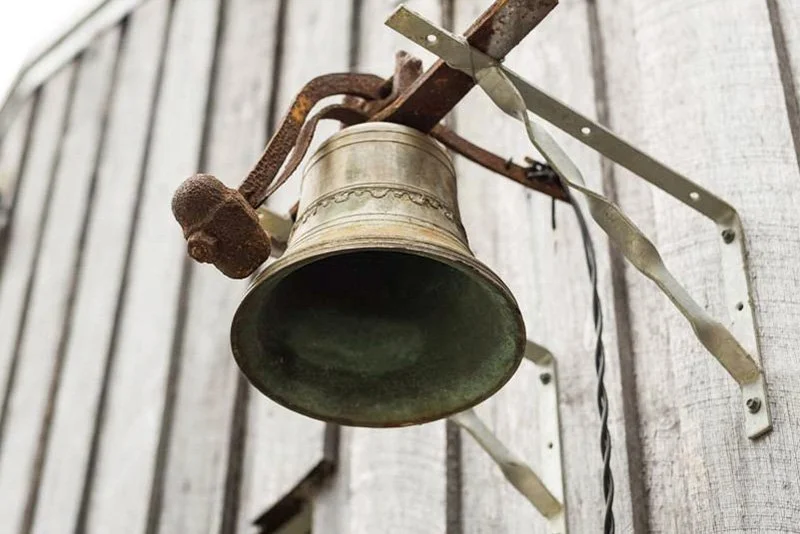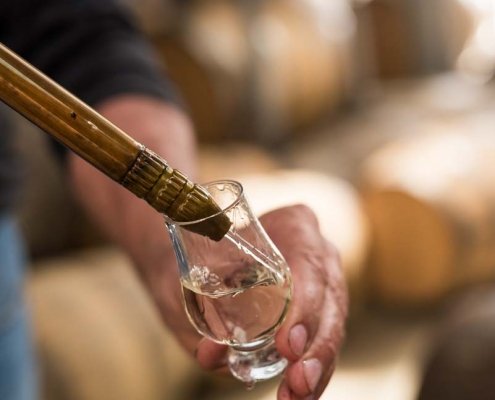Tasmanian Angel: McHenry Distillery
In Berlin at BCB I had the opportunity to have a chat with a distiller who came all the way from Tasmania, an angel of a guy.
The McHenry Distillery team
My interview with Bill
Can you introduce yourself?
I’m William McHenry and I have my own company, the McHenry Distillery with my wife Alison.
When did you start the company?
We started in 2010 but the idea came way before that. Alison and I lived in America for a number of years. We worked for Pfizer Pharmaceuticals, at the time it wasn’t well known in Australia but of course now it’s known because of the vaccine.
And the little blue pill…
That’s only if you're a man over 60 (laughs). So anyway, we returned to Australia and we were looking for another career after pharmaceuticals. My wife is a doctor, and we had a neighbor who said over a barbecue and a red wine one day, “with a name like William McHenry, you should learn the bagpipes and make whisky”. And so that started the ball rolling and the idea that maybe we could start a distillery.
So then we started thinking: if we’re going to make whisky, where will we make it? If you're familiar with Australia, it's a big country, but a lot of is hot and dry, there’s not a lot of water and where the water is it's not very good quality because it doesn’t rain so often.
So we looked for parts of Australia where we felt it was perfect climate and the perfect rainfall for whisky, so we headed as far south as we could until we hit a little state called Tasmania. Tasmania is about the size of Ireland and has a population of only half a million people, so it’s quite remote. There you can find forests, and lots and lots of water. It was the perfect environment to make whisky. So we sold our house in Sydney and moved down there in 2010 and started making whisky.
Bill and Alison McHenry chose Tasmania to set up their distillery for the clean air and climatic conditions so similar to Scotland.
At the distillery we have this beautiful pure spring water and in Tasmania we have the cleanest air in the world. If you think about the air we breathe, its gets its grubby footprint from human’s activities, smoke, and pollution. Well, the air that reaches Tasmania has to travel 10,000 miles, so the last piece of land it leaves is South America and it wraps itself all around the globe. Tasmania is further south than Africa, and during its long journey it’s had the time to scrub its impurities and any pollutants fall down in rain, so that by the time it gets to us, it is as clean as it can ever get.
William in Port Arthur
Do you find that when you leave Tasmania can you feel the difference in the air that you breathe?
We notice it because you can’t see it in the air. For example, we were we were in England recently. We went for a short walk to the top of a hill and you could see the air on the horizon. That’s something you don’t see in Tasmania. The light is different because there is no air pollution.
So that’s got to have an effect on your product.
If you think about the water from the clouds that goes through the air if the air is clean then the water that fills the aquifer which feed our spring is also pure and clean. It’s perfect.
Who helped you get started? You didn’t have an expert?
It was just me and my wife. We both have a science background and inquisitive minds. When I started out the idea I started researching, so really was a process. I went to Scotland a couple of times and we are lucky these days because a lot of the research is at our fingertips on the internet so I was able to read a lot and to learn about it. To be honest, the process is relatively simple and the ingredients are simple - barley, yeast and of course water. You need passion, patience and you need good ingredients. And there's a classic latin phrase: see one do one teach one . A lot of learning is in the doing and I was so was committed to wanting to learn—and I learned the hard way.
We're are unique in Australia because e have a spring right behind the distillery. So it's almost like Scotland with the water coming out of the mountain. That's exactly what it's like… so having simple and very pure ingredients is what really makes the difference.
The barrel aged single malt whisky
Navy strength gin at 57% alcohol.
What is your base grain?
For the single malt, we use Tasmanian barley which is plump ripe and oily. We brew in our own brewery, and produce a million litres of whisky beer wash a year which we distill into 100,000 liters of whisky a year. We also produce a seasonal beer, a stout, an English pale ale and a Session ale which is a low alcohol beer.
So tell me about your whiskies.
To put it very simply, whisky is distilled beer. So our single malt is a little bit unique from some other Australian distillerys because we don’t buy our beer, we make it ourselves. We are 100 km south of the capital city of Hobart with a cold, moist maritime environment where the angel’s share is low (1%), so we can keep our whisky in the barrels for a long time. On average, Tasmanian whisky is typically four to five years old, but we aim to release ours at 10 to 12 years.
Okay, so if you started this company in 2010 you couldn’t have whisky until 2020.
The ironic thing was the original whiskies we were selling came from another well established distillery, which is now become iconic in Australia. It's called Sullivan’s Cove. And three years ago they actually won the world's best.
So we invested in their whisky selling whisky under a private label called Three Capes. That brought us to the point where we could sell our own. We also had the benefit of the gin craze, and we made gin for celebrity MasterChefs, our Parliament and for the Army. So we've actually developed a really good reputation as specialist distillers.
How would you compare your whisky to Scottish whisky?
It’s a highland style scotch. At the moment we make an unpeated whisky. In the future we will release a peated whisky, using peated grain from Scotland. We’ve chosen to actually use Scottish grain because we feel it's some of the best peated grain in the world. And we want to create the highest quality.
You can't source peat in Tasmania?
You can but the producers who use barley use it for beer and they don’t want to contaminated it with peat, so you can’t get peated barley here, and that’s why we went to Scotland.
And how are you placed in the market?
The Italian Bell
After signing a sales agreement with the distributor Divini Spiritus from Italy, William brought back this bell to affix above his distillery door to commemorate the accord.
As far as sales? We're not the biggest but we'd be in the top five facilities. We were lucky to start early so that helped put us in the top tier.
How many products are in your line?
We produce 8 gins, 1 vodka, 2 whiskies- a peated and an unpeated, a brandy and a rum and now can our own beer.
The rum using cane sugar?
We use molasses from Australia and as much as we can get from Tasmania. And for our brandy, we work with some of the local wineries. We make an XO 5 and a 7 year old brandy.
Do you do offer visits to your facility?
We do tours during the hours the distillery is open from Monday to Friday. As long as it's between the hours of 11 and four you can come and do a tasting and watch our people at work, see the aging facility; it’s a real working distillery.
A tasting out in nature
How does a tour at your distillery compare to one in Scotland?
It’s a similar experience but our typical groups are from 4 to 6 people and it’s myself or our distiller who shows people the process. So you can really hear the story from the source.
Testing the products in the lab
Can you have good years and bad years with whisky like you do with wine?
Well we do in the sense that it's barrelled. So we could have two similar barrels basically filled in the same month with the same spirit. But one is just simply better than the other. But what we find is when there is a barrel we don’t like, we leave it –barrels mature in time—it’s almost like children: you can have twins and they have the same genetics, but they are always a bit different. Barrels are the same way.
liquid coming off the still
Do you consider your products more for cocktails or for drinking neat?
We like them to be tasted neat, because we like to showcase all the flavour, the layers of flavor we get into whisky. Naturally, the gins are well adapted to cocktails, but we do sipping gins as well. We have an aged gin which is 10 years in a Solera method, that’s a beautiful one, and we have a sloe gin too.
Are you working with any interesting bars that might be well known cocktail bars in Tasmania.
So we've got Gold bar in Hobart, a little hole in the wall bar that fits 10 people and they make the most ingenious cocktails. Society is a favourite too but to be truthful we support all the bars in Tassie. Each year we have a cocktail competition with our products. We also started producing Birdy Gin for the Wrestpoint Casino in Hobart (The Birdcage bar).
An angel promotion
McHenry produces a special run of their Classic Dry Gin for your cause.
They create bespoke labels for your bottles, detailing the specifics of your charity. You set the retail price and they put them up on their website for sale.
You promote your cause, send people to the site and they purchase a bottle.
McHenry provides the gin, bottles and labels at wholesale cost, they pay the GST, postage and handling as well.
A family business
Here do you see the company going in the next five years?
Look, we are in a tiny little corner of Australia so we really need to look to export for our business. I'd like to think that we can grow steadily over time into Europe, America and Asia. But one thing that I hold dear are our two young daughters. I’d love to see them in the business one day running the export business.
How old are they?
Lucy is 19 and Kate is 25.
Do they show any interest in joining?
Well they like the products (laughs). One is a nurse and the other is a lawyer, I would hope that at some point they would like to join the family business and helping it expand even further.
Can we find your products in Europe?
Yes, Divini Spiritus is our distributor for Italy and the EU.
McHenry is well on its way to becoming a force to reckon with in the southernmost distillery on the planet. Best of luck in your pursuits and I hope to get to Tasmania to take a tour myself!
You are welcome anytime Sharla!










